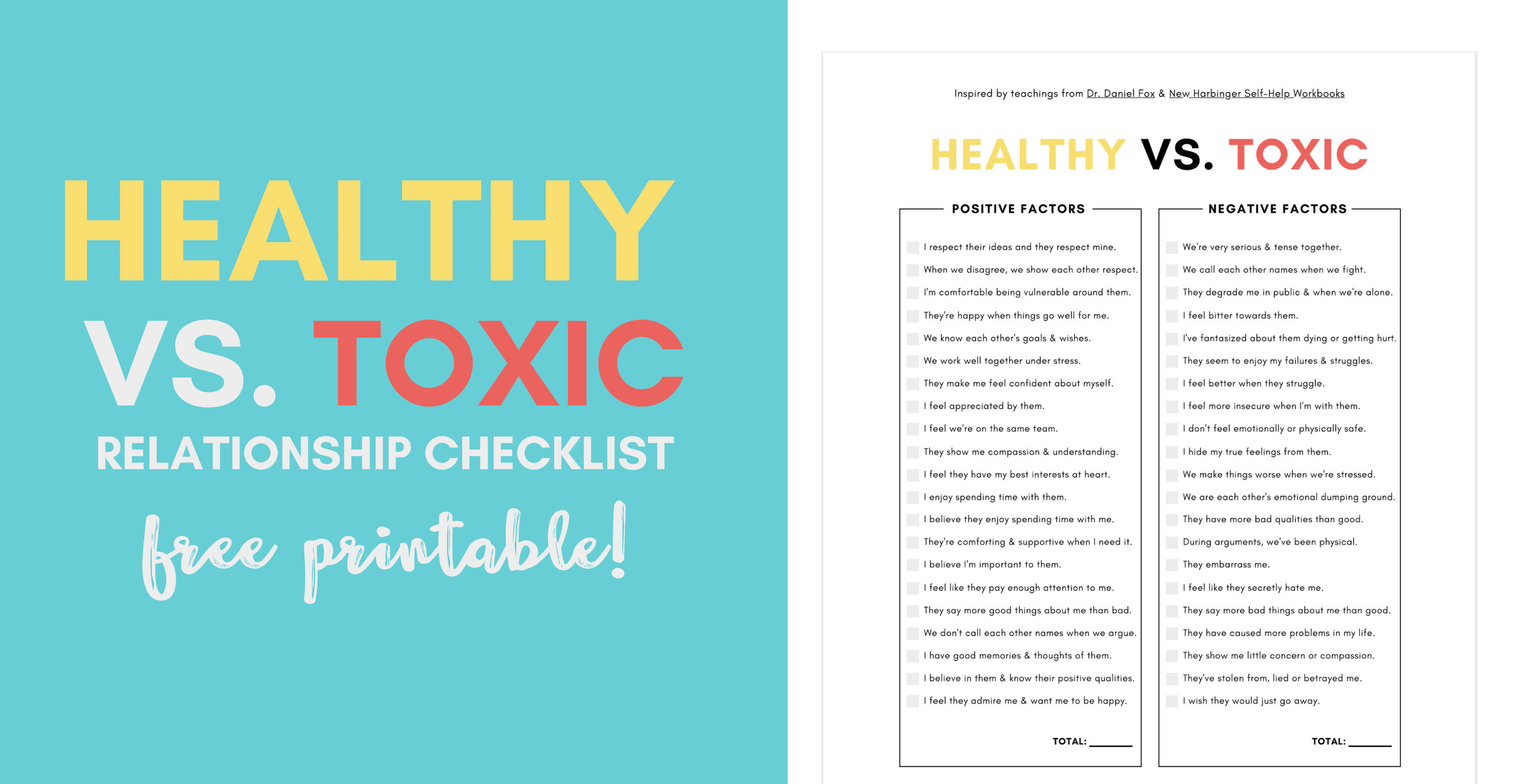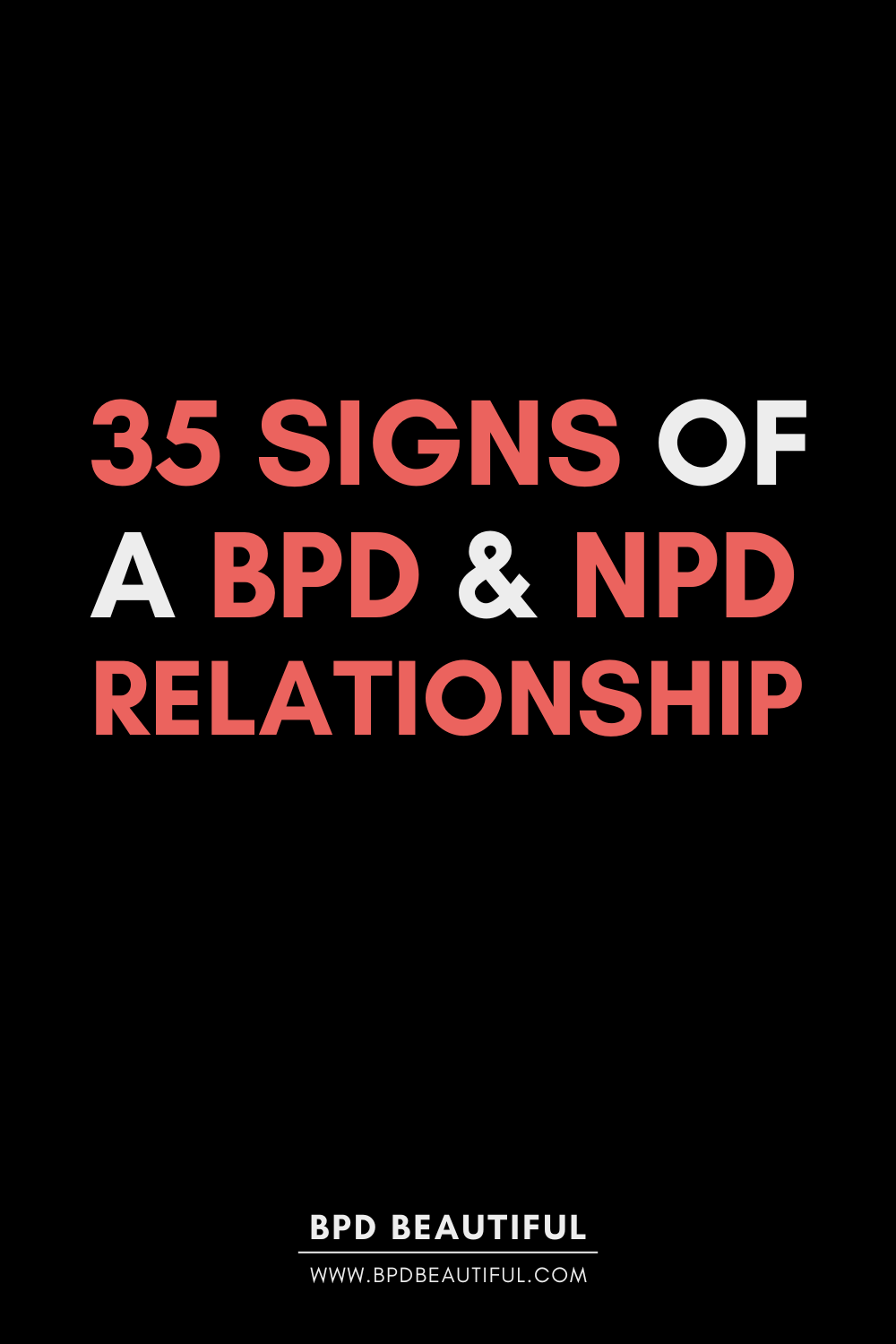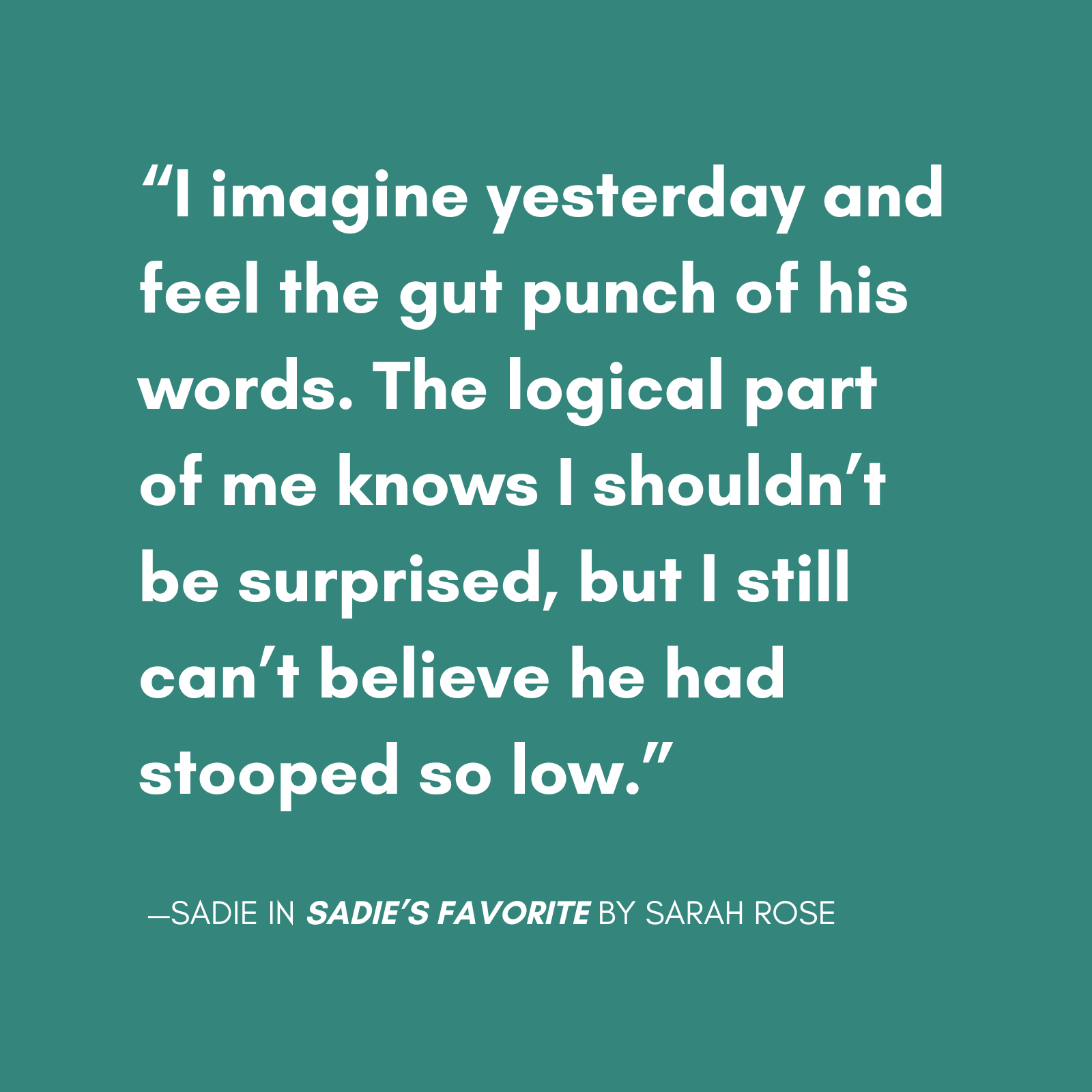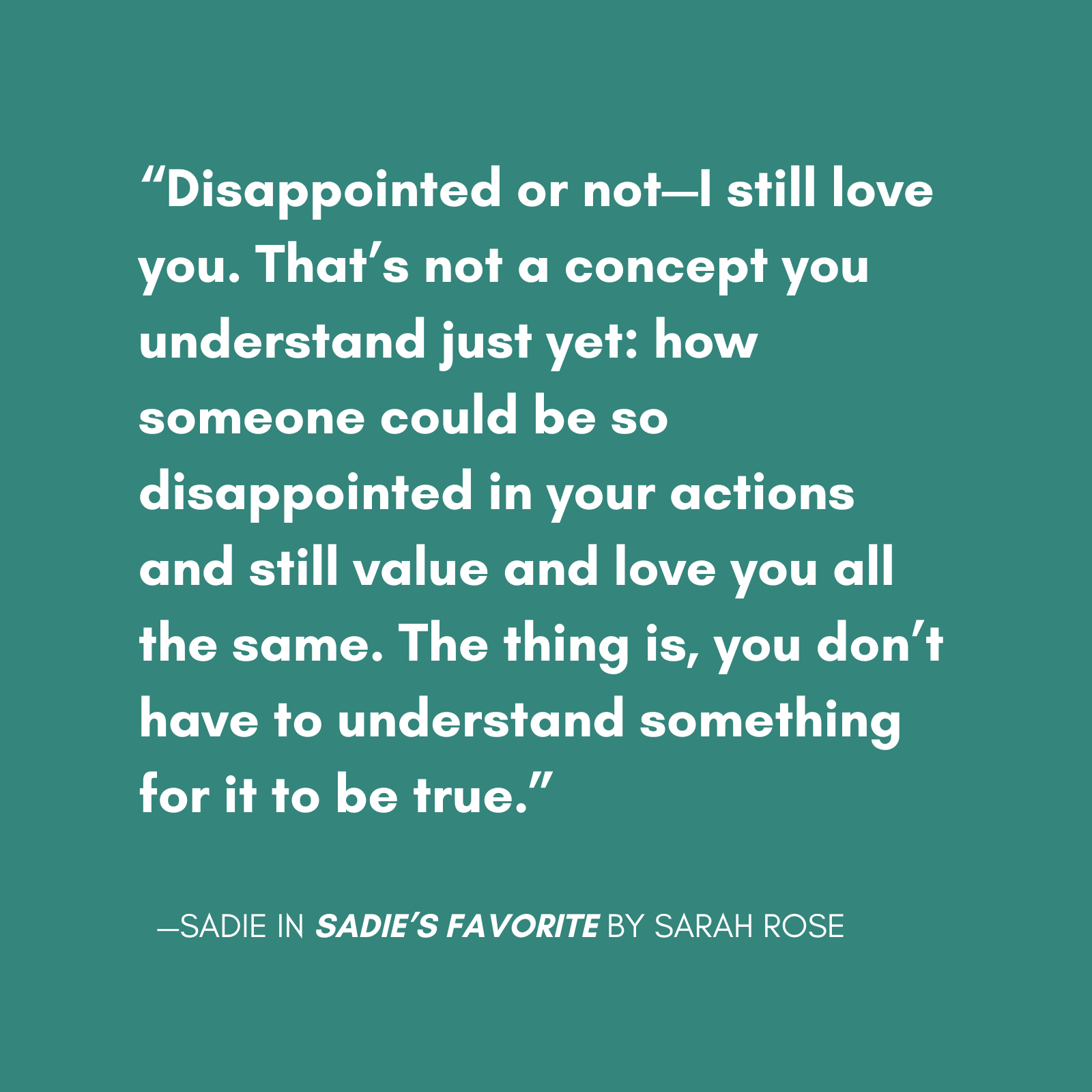Trigger Warning: Narcissistic abuse. “Borderline” and “Narcissist” are used as labels for simplicity & SEO purposes but these terms may feel shameful to some – we also can’t armchair diagnose others. Read at your own discretion.
Are you living with BPD and in a difficult relationship with someone you think may be narcissistic? Perhaps they say hurtful things or make comments that make you feel like your feelings and opinions don’t matter. Or, maybe after spending time together, you often find yourself feeling drained or exhausted due to the constant drama and manipulation. If this sounds familiar, then it’s possible that your partner is narcissistic and you’re in a borderline and narcissist relationship.
Being in any type of relationship with someone who has narcissistic traits or NPD can be incredibly challenging – but it’s especially hard if you have borderline personality disorder (BPD). In this blog post, we aim to provide clarity so that those in a potential borderline and narcissist relationship are better equipped to comprehend their dynamic more clearly.
We’ll do that by going over 35 signs you can use to see if you may be in a borderline and narcissist relationship. But first, let’s cover some basics about the BPD and narcissist couple.
BPD vs. NPD: Key Differences
Borderline personality disorder (BPD) and narcissistic personality disorder (NPD) are two distinct mental health conditions that can have a major impact on an individual’s relationships, self-image, and sense of wellbeing. While both conditions involve a persistent pattern of difficulty with interpersonal relationships and emotional regulation, there are key differences between them.
(Read ‘Healthy vs. Toxic Relationships: BPD Edition’)
BPD is characterized by intense mood swings, unstable feelings about oneself and others, impulsive behaviors, fear of abandonment or rejection from loved ones, suicidal thoughts or actions, as well as identity disturbances.
NPD involves grandiosity in behavior or thought patterns; the need for admiration from other people; preoccupation with fantasies of power and success; lack of empathy for others; entitlement issues; arrogance in attitude or behavior; envy over other people’s achievements; and manipulation to get what one wants without regard for another person’s needs or feelings.
(Read ‘BPD and Narcissist Couple: What It Looks Like‘)
It’s important to note that narcissism works on a spectrum – a narcissistic partner may not actually have the personality disorder that’s in the DSM-5. If they do meet criteria, only a mental health professional can diagnose them with that. Because narcissistic abuse impacts similarly whether there’s a diagnosis or not and for simplicity and SEO purposes (to reach a broader audience and spread more awareness), we use the terms narcissistic and NPD interchangeably throughout this article. However, it’s important to know and keep in mind the difference and to not diagnose others.
“THIS STORY WILL HELP SO MANY PEOPLE.” -BETA READER
From the creator of BPD Beautiful, Sadie’s Favorite tells the story of a girl lost, a woman recovered and the trauma in between. Coming October 22, 2025.
Differences of Symptoms in a Borderline and Narcissist Relationship
Borderline personality disorder symptoms…
- Frantic efforts to avoid abandonment.
- A pattern of unstable and intense interpersonal relationships.
- Unstable self-image or sense of self.
- Impulsivity.
- Recurrent suicidal ideation or self-harm behaviors.
- Intense emotional instability.
- Chronic feelings of emptiness.
- Rage.
- Transient, stress-related paranoia or dissociation.
Narcissistic personality disorder symptoms…
- Belief that one is unique or special.
- Constant need for attention, affirmation, and praise.
- Exaggerated sense of one’s own abilities.
- Exploiting other people for personal gain.
- Feeling envious of others, or believing that others are envious of them.
- Lack of empathy.
- Persistent fantasies about success and power.
- Preoccupation with power or success.
- Sense of entitlement.
A person with BPD seeks acceptance & nurturing. A person with BPD seeks validation of their self-esteem. A person with BPD fears they will be abandoned, that they are worthless and unlovable. A person with NPD fears they will be publicly exposed as an imperfect fraud. A person with BPD is triggered when they feel they’re about to be abandoned. A person with NPD is triggered by things that threaten their self-esteem.
A person with BPD has difficulty being alone and tolerating negative emotions. People with NPD struggle to see other people as equals. A person with BPD has too much emotional empathy but lacks cognitive empathy. A person with NPD has cognitive empathy but severely lacks emotional empathy. A person with BPD gets angry when they feel abandoned. A person with NPD gets angry when they feel disrespected. A person with BPD devalues you to prevent abandonment. A person with NPD devalues you to support their own self-esteem.
Why Do Borderlines and Narcissists Attract Each Other?
The combination of a borderline personality disorder (BPD) and narcissistic personality disorder (NPD) can be a toxic one. People with BPD are often attracted to people with NPD or narcissistic traits due to the intense emotions they both share, as well as their shared need for validation from others. On the other hand, people with NPD may be drawn to those with BPD because of the admiration they receive from them and the control that comes along with it.
However, this dynamic is not healthy for either party in the long run, as each individual has difficulty regulating their own emotions or respecting boundaries set by another person. The result is an unhealthy relationship where neither partner feels understood or appreciated. At times, it can even be downright abusive.
The BPD and Narcissist Couple
People with narcissistic traits or Narcissistic Personality Disorder (NPD) may say hurtful things or make you feel like your feelings and opinions don’t matter. They might try to manipulate you in order to get what they want, without caring about your needs or feelings. People with Borderline Personality Disorder (BPD) are especially vulnerable to this kind of abuse because of their fear of abandonment and tendency to have intense mood swings, unstable relationships and impulsive behaviors.
People living with BPD often struggle to maintain healthy relationships and may easily become entangled in abusive ones. Those with narcissistic traits (NPD) may further complicate this issue, as their symptoms can directly target and manipulate people with BPD. In turn, the person living with BPD will likely experience worsening BPD symptoms or plateau in their recovery progress; other times, the narcissistic abuse can evoke suicidal ideation. This is why borderline and narcissistic relationships can be dangerous and should be avoided.
35 Signs You’re Dealing with a NPD and BPD Relationship
1. Your partner often belittles your thoughts and opinions.
2. They are typically the center of attention, even when it’s not their turn to speak or be noticed.
3. They rarely acknowledge or value your feelings or needs; they mostly only care about what they want in the moment.
4. You feel drained after spending time with them.
5. They need constant admiration from other people, even if it means putting you down in order to get it.
6. When things go wrong, they usually don’t take responsibility– instead they blame you for any mistakes made.
7. They have a tendency to overstate their achievements and successes, especially in comparison to yours. They may compare your circumstances, traits or possessions with theirs and make it known (directly or indirectly) that they are superior.
8. They expect big returns or an extreme amount of appreciation for their small favors and bare minimum effort.
9. They almost always blame others or outside forces for their own failures and problems.
10. Your partner is always trying to “one-up” everyone around him/her.
11. Everything must revolve around them: conversations or fights shift back towards them within moments of starting.
12. They use your fear of abandonment against you – they may withhold or disappear emotionally or physically to provoke reactions. When you do react, they twist the situation with projection or blame shifting. They may declare that they ‘hate’ these long, drawn out arguments and are getting tired of your constant neediness, even though their manipulation is what’s triggering and intensifying your BPD symptoms. They call you “unstable” or “too sensitive.”
13. You regularly feel unappreciated, shamed, belittled and minimized by your partner’s words or actions.
14. Your partner often puts themselves first, regardless of how it affects you or the relationship. The same goes for children, if you have them.
15. You feel like your opinion is not valued and they may even go so far as to try to control what you think or do.

DOWNLOAD FREE PRINTABLE
Measure how healthy or unhealthy your BPD relationship is with the Healthy vs. Unhealthy Relationship Checklist.
16. They take pleasure in making other people feel bad about themselves and will use passive-aggressive tactics to gain an upper hand in any situation.
17. At the beginning of the relationship, they matched your intense emotions and idealizations with grand gestures or romantic declarations of love (also known as love bombing). It felt as though you’d found your soulmate, as though you’d finally found someone who loved as passionately as you. You were instant best friends and lovers.
18. During the love bombing phase they may have mirrored your goals, beliefs, preferences, characteristics or traits – if you’re living with BPD, you may have mirrored them as well in an attempt to keep their love and respect and be the “perfect” partner. With mirroring and idealization from both partners, the relationship felt like a Hollywood romance and a perfect match – a dream relationship fulfilling all of your relationship goals.
19. Conversations with them always seem to be about them rather than the topic at hand, leaving you feeling unheard and unimportant.
20. They lack empathy for others – including yourself – believing that their needs are more important than anyone else’s, no matter how much it hurts those around them.
22. You constantly find yourself on the defensive because your partner is tries to prove they’re right and make you wrong in every conversation or argument – even if it’s something insignificant like a difference of opinion over which restaurant to go to.
23. Your partner has grandiose ideas about who they are and what they can accomplish. They’re frequently envious of others.
24. Your partner exaggerates their own importance, power or accomplishments.
25. When you first started dating, they may have made it known (directly by saying it or indirectly through their behavior) that they liked your dependent nature and/or clingy tendencies (due to borderline personality disorder). They enjoyed being ‘needed’ as it made them feel important and gave them a sense of control.
26. They are quick to take credit for your successes and slow to take responsibility for their mistakes.
27. They don’t seem to understand how your feelings are affected by their words or actions – and even when you explain it clearly to them, they don’t show compassion or concern.

28. Your partner has an unrealistic view of the world, expecting special treatment no matter what situation they’re in or who they’re interacting with.
29. You often feel like a victim because of the way your partner speaks and acts around you – as if they are superior and know better than you do in every circumstance imaginable!
30. Your relationship is extremely volatile and extreme, and you may break up or be on the verge of breaking up frequently.
31. You have amazing makeup sex or an extremely passionate sex life – or at least you used to.
32. Both you and your partner switch between idealizing and devaluing the other (but your motivations, intentions and feelings behind this behavior differs), and you both may have a tendency to turn small conflicts into long, drawn out fights due to intense emotions. However, your partner may appear to be more in control of their emotions than you are of yours. They likely hold this over your head or use it as a reason to degrade you, i.e. calling you “unstable” or “too needy.”
33. Your partner puts themselves first at all times – disregarding any needs that you might have in the relationship or otherwise without consideration for how this affects you emotionally/mentally/physically etc.
34. They have a hard time accepting criticism and will sometimes lash out when confronted about something negative that was said/done towards them (even if warranted).
35. In conversations, they always make sure that everything is about them – never really listening to what anyone else has to say unless it’s praise directed at them specifically.
What to Do if You Think You’re in a Borderline and Narcissist Relationship
It’s important to recognize the signs of a NPD and BPD relationship and take action. If you’re in an abusive relationship with someone who exhibits narcissistic behaviors (whether you have BPD or not), consider the possibility of leaving the relationship and going No Contact. The thought of leaving may feel impossible or extremely scary. That’s okay. It takes time to break the trauma bond. So if you don’t feel ready to throw in the towel, educate yourself on the BPD and narcissist relationship dynamic and learn ways of dealing with narcissistic abuse while simultaneously focusing on your own BPD recovery. In time, your circumstances may change and your continued growth will empower you.
For those with borderline personality disorder who are victims of narcissistic abuse, it is important to remember that you have the power and strength within yourself to make positive changes in your life. It can be difficult to recognize when a relationship has become toxic but by understanding the signs of NPD and BPD relationships, you can take steps towards protecting yourself from further harm – in whatever way that looks like.
Reach out for support and maintain a support system outside of your partner – whether it’s from friends or family members or professionals – so that you can start on the path towards healing and recovery. Remember that no one deserves to suffer in an abusive situation; seek support today so that you can reclaim control over your own happiness and wellbeing.

Looking for BPD Characters?
Sign up below to read the first 6 chapters of Sadie’s Favorite – an upcoming novel by Sarah Rose, creator of BPD Beautiful.
BPD Resources
BPD Characters: Read the first 6 chapters of Sadie’s Favorite – an upcoming novel by Sarah Rose, creator of BPD Beautiful.
Get 20% off your first month of BetterHelp. Get matched with a licensed therapist within 48 hours. Subscriptions as low as $65/week, billed every 4 weeks. Cancel anytime.
Manage your BPD symptoms with a printable workbook.
See our recommended list of books about BPD.
Start a Discussion
Do you have an experience with dating someone who has narcissistic traits? Share your borderline and narcissist relationship story in the comments.
Pin This Post
Liked this post? Please help support BPD Beautiful and spread BPD awareness by pinning it on Pinterest.






Comments
One response to “35 Signs You’re in a Borderline and Narcissist Relationship”